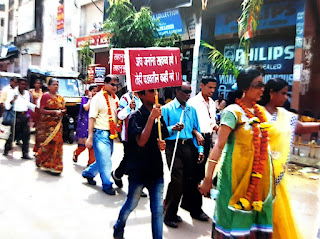Sajida: The Conqueror of Darkness
It is impossible not to be impressed by Tamollanghan (Conquering Darkness) – the autobiography of a strong and sensitive person
told in a straightforward, thoughtful manner. Sajida Sheikh-Meshram born in a
middle-class Muslim family of Hyderabad becomes blind in a childhood accident.
With her father’s support she travels to Mumbai and studies in a series of eminent
schools including the Kamala Mehta Dadar School for the Blind and colleges like
Wilson College and SNDT. She outshines her ‘normal’ classmates not only in
studies but in poetry recitation and debates. At the Andheri Industrial Home
for Blind Women, she trains herself in a range of skills from tailoring to
cooking to home management. She learns telephone operating at the National
Association of the Blind. From the wide world of the metropolis she is thrown
into the villages of Chandrapur where her husband works as a Zilla Parishad
teacher. From Hyderabad to Mumbai to Pune to Chandrapur – Sajida’s life takes
many ups and downs which make the core of her autobiography.
Sajida's autobiography straddles the inner, the domestic and
the public worlds. It tells the
compelling tale of how a woman with a sharp mind and a tenacious disposition
overcomes the twin challenges that life throws her. On the one hand is the
challenge of her own blindness and on the other hand is the challenge of
discrimination and indignities that the outer world heaps on her through their
words and actions.
Written in simple, almost conversational Marathi, Sajida allows us entry
into a world that not many have access to. She describes how the blind measure
cloth, how they pour tea into cups, give the baby a massage and a bath, how she
has a mental map of the house that enables her to keep it spotless clean, how
she learned to draw water from the well and lift the pot without spilling a drop. Sajida talks to the reader with a directness that has neither self-pity nor self-praise.
There is a seriousness with which Sajida and her partner Revanand approach even the most frustrating situations. For instance, when Revanand’s family insists that he should marry a normal girl even though he himself is blind, he explains why it is important for him to marry a well-educated blind person like Sajida. He uses the examples of many blind couples he has met in Mumbai who are happy together. Similarly, when Sajida’s mother wants a Muslim name for her grandson, it is up to Sajida to make a list of names like Sameer and Sahil that are acceptable to her parental as well as her marital families.
The book is filled with the characters that Sajida meets – many are
unkind or ignorant but many more are friendly and helpful. There are also beautiful
moments like the candlelight dinner at the Tata Institute of Social Sciences
where Revanand was completing his Masters in Social Work. Sajida describes in
detail her dress, the decorations, the food and the excitement, and how
Revanand’s friend Mathew a Ph.D. scholar acted the ‘eyes’ of the newly-married
couple that evening.
In the entire book Sajida comes across as a voice advocating on behalf
of the blind. She insists that the blind can not only be self-sufficient, they
can contribute equally to society as any other person. Her message to parents
of blind children is to ensure that the children are educated and independent –
not to make them diffident and dependent by employing full-time nurses and
maids.
(Tamollanghan will be published
on 5th December 2021, 10.30 a.m., at I.M.A Hall Chandrapur.)
- Paromita Goswami










3 Comments
What an inspiring story Paromita. Thanks for the review. Sajida left too early. Hoping people will be inspired by her work and carry it on and make her feel proud wherever she is.
ReplyDeleteInspiring to the core.
ReplyDeleteIncredible journey of Sajida, thanks for sharing paromita. Wish I could read the original version.very inspiring indeed
ReplyDelete